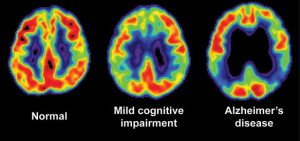 Medical News Today reports that there could be a breakthrough in the cure for Alzheimer’s diseases. Typically, Alzheimer drugs test poorly because the drugs are given in stages that are too late to be cured. These drugs are supposed to be taken during the early stages of the disease; however, the early stages of Alzheimer’s have been notoriously difficult to detect. This new study done at King’s College could possibly change this challenge as researchers have identified a group of ten proteins in the blood that could possibly predict the early stages of Alzheimer’s disease.
Medical News Today reports that there could be a breakthrough in the cure for Alzheimer’s diseases. Typically, Alzheimer drugs test poorly because the drugs are given in stages that are too late to be cured. These drugs are supposed to be taken during the early stages of the disease; however, the early stages of Alzheimer’s have been notoriously difficult to detect. This new study done at King’s College could possibly change this challenge as researchers have identified a group of ten proteins in the blood that could possibly predict the early stages of Alzheimer’s disease.
The study involved over 1,000 participants as the largest study in the Alzheimer’s cure development field. Early this year, US researchers said that they have found 10 biomarkers that can predict with 90% efficiency weather or not someone will develop Alzheimer’s within a three-year time span.
So far, there has been no simple method to tell weather or not someone with mild cognitive impairment (MCI) will develop into Alzheimer. This recent study has shown song strong developments in this conundrum as the team analyzed over 1,000 participants: some with Alzheimer’s disease, some with MCI, and others without the disease. They analyzed 26 different proteins in each blood sample and found 16 that are strongly correlated to brain shrinkage with those who have MCI and dementia.
They can now predict, with 87% accuracy, if an individual with MCI will progress to Alzheimer’s disease within a year. This is done by a certain combination of 10 proteins. The aim of these tests is so that doctors can predict weather or not an individual has early stages of Alzheimer’s disease so that they can be properly medicated. This test is not ready to hit the public yet as the researchers are using this to improve clinical trials for upcoming treatments of early stage Alzheimer’s disease.
This blog post is based off of this article from Medical News Today.
